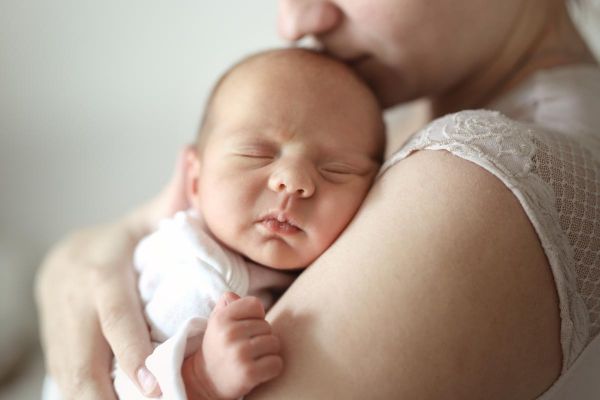 Postpartum depression is estimated to affect some 16.5% of all people giving birth. That’s on top of data showing that a further 29.2% of pregnant persons experience natal depression. Most importantly, while postpartum depression is well known and talked about, fewer people are aware that anxiety is just as, if not more common during this period. In fact, while commonly known as postpartum depression, this syndrome includes anxiety and individuals can be diagnosed with either strong anxiety or strong depression to get “postpartum depression”. Additionally, while postpartum depression is a diagnosed disorder, the “baby blues” or “postpartum blues” is a lighter version, which affects nearly 86% of persons during and after pregnancy. The difference is that the “baby blues” go away within a few weeks and postpartum depression does not.
Postpartum depression is estimated to affect some 16.5% of all people giving birth. That’s on top of data showing that a further 29.2% of pregnant persons experience natal depression. Most importantly, while postpartum depression is well known and talked about, fewer people are aware that anxiety is just as, if not more common during this period. In fact, while commonly known as postpartum depression, this syndrome includes anxiety and individuals can be diagnosed with either strong anxiety or strong depression to get “postpartum depression”. Additionally, while postpartum depression is a diagnosed disorder, the “baby blues” or “postpartum blues” is a lighter version, which affects nearly 86% of persons during and after pregnancy. The difference is that the “baby blues” go away within a few weeks and postpartum depression does not.
Understanding how postpartum depression affects your mental health, causes anxiety, and impacts your life can help you to get treatment, to help a loved one get diagnosis or treatment, and to move forward with your life. Postpartum depression and postpartum anxiety are extremely common. 4 in 25 people will experience it after having given birth. Seeking out help, getting treatment, and recovering is the best way to move forward.
What is Postpartum Depression Really?
Postpartum depression or postnatal depression is an umbrella term used to cover a range of mental health disorders following pregnancy and childbirth. They overlap with natal depression, which occurs during pregnancy and can be a continuation of the same. However, postpartum depression is specifically diagnosed as depression, anxiety, mood swings, irritability, and other mental health disorder symptoms that do not go away within 2-5 weeks following childbirth.
While many people advocate for creating separate diagnoses for postnatal anxiety versus depression, they are currently one and the same in most medical textbooks. This means you may be primarily anxious and still receive a “depression” diagnosis.
Symptoms of Postpartum Depression
Postpartum depression is normally diagnosed after 2 weeks of moderate to severe symptoms of baby blues. These include and are characterized by the following symptoms:

- Sadness or depression
- Undirected or General Anxiety
- Directed Anxiety (E.g., I cannot take care of my baby, I cannot bond with my baby, what if I don’t love my baby)
- Feelings of emptiness
- Frustration
- Restlessness
- Irritability and mood swings
- Anger
- Low self esteem
- Thoughts of self-harm or suicide
- Reduced interest in pleasurable and social activities
- Low libido
- Fatigue and decreased energy
- Poor self-care
- Insomnia or hypersomnia
Essentially, the symptoms heavily overlap with both chronic depression and chronic anxiety. Most users primarily express in anxiety, “I have to take care of a baby, my baby”. That’s important, because this is a large and life-changing thing. The stress of caring for a baby and taking on such a massive amount of responsibility is thought to be one of the contributors to postpartum depression. So, it makes sense that anxiety over such is a primary response. However, anxiety doesn’t have to be directed. Individuals may simply spend more time worrying, may be stuck in negative thought loops, and may find themselves being anxious about relationships and areas of their lives or work which they were previously confident in.
Causes and Risk Factors of Postnatal Depression
There are no specifically recognized causes of post-natal depression. Instead, a range of factors come together to contribute to the diagnosis. Most tellingly, while postpartum depression is most-often attributed to hormonal changes (and these play a large role in frequency of diagnosis), non-child-bearing partners can and do experience postnatal depression. Therefore, it’s accepted that hormonal changes and stress on the body are a risk factor and greatly increase the likelihood. However, psychological, psychosocial, and mental health history factors also play a large role.
 Psychosocial Risk Factors:
Psychosocial Risk Factors:
- Fatigue and loss of sleep. This is exacerbated by the physical toll of carrying a child and childbirth.
- Spending all free time caring for a child
- Lack of support from family/friends
- Relationship strain
- Financial stress
- Stressful life events during the pregnancy
- High expectations of the self
- Societal pressure to recover
- Feeling overwhelmed
- Birth-related trauma
- Questioning ability to care for, bond with, or be there for the baby (e.g., difficulty breastfeeding)
- Anger, loss, or guilt, such as after a miscarriage, in case of a sick baby, or other problems during labor (e.g., the baby has temperament problems or colic)
These all contribute towards creating trauma and pushing someone into a state of anxiety, depression, and feeling “down”. When this becomes pathological and chronic, it becomes postpartum depression.
Other Risk Factors:
- A family history of mental health problems, especially bipolar disorder
- A personal history of mental health problems, especially bipolar disorder
- A past history of trauma
- A partner having PDD (50% of non-birthing parents with post-partum depression are diagnosed after their partner)
- Hormonal irregularities
- A past history of post-partum depression
- Inflammatory illnesses such as Chron’s disease, irritable bowel syndrome, rheumatism, etc.
- Chronic illnesses
- Some pain-relief medications such as Oxycontin administered during labor
Essentially, the risk factors for postpartum depression and anxiety are broad. Additionally, there is no one cause. Like with other mental illnesses, postpartum depression can appear in two patients who have almost no overlap in symptoms or risk factors.
Getting Treatment for Postpartum Depression and Anxiety
 Depending on the symptoms and severity of postpartum anxiety or depression, treatment includes medication and mental health treatment or mental health treatment alone. Here, your best option is to consult with a doctor to determine the best approach. In all but the most severe of cases, a therapy-first approach is preferred, especially for those who are currently breastfeeding.
Depending on the symptoms and severity of postpartum anxiety or depression, treatment includes medication and mental health treatment or mental health treatment alone. Here, your best option is to consult with a doctor to determine the best approach. In all but the most severe of cases, a therapy-first approach is preferred, especially for those who are currently breastfeeding.
Therapy includes a combination of cognitive behavioral therapy, group therapy, and counseling. These work to help people with post-partum depression to cope, to overcome the psychosocial contributors to their disorder, and to build healthy habits and routines that get them out of the depression. In most cases, after treatment, postpartum depression goes away. However, it can become ongoing and long-term if not properly treated and if routines aren’t maintained. Additionally, you’re especially at risk if you have another pregnancy following post-partum depression.
Therefore, it’s always a good idea to seek out a program with aftercare, long-term follow-ups, and an approach geared around building a healthy and happy life rather than simply overcoming symptoms.
If you or a loved one is struggling with anxiety after giving birth or after welcoming a child into the family, you’re not alone. Millions of us struggle with post-partum depression. There is help, and the professionals at the Gooden Center can offer it in a personalized, home-like setting where you receive the care and treatment you need to recover and get your life back.